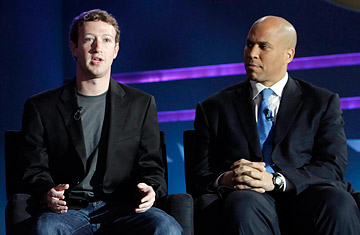
Facebook founder Mark Zuckerberg, left, and Newark Mayor Cory Booker
When Facebook founder Mark Zuckerberg announced last week that he'll be giving $100 million to New Jersey's Newark Public Schools, it was the first education gift — or, for that matter, the first major gift of any kind — made by the 26-year-old internet mogul, who is worth at least $6.9 billion, according to Forbes. The details on Zuckerberg's five-year gift are not public yet, but the money will have to be matched by other funders. The gift apparently came about because over the past few months, Zuckerberg got to know Newark's charismatic mayor, Cory Booker, came to admire Booker's passion for reform, and wanted to help. Yes, yes, Zuckerberg's detractors have been quick to point out that his philanthropic debut comes just before The Social Network, an unflattering account of his role in launching Facebook, hits theaters nationwide on Oct. 1. But education reformers want to keep the focus on what the money can accomplish rather than what may be behind it.
Regardless of the reason why Zuckerberg is starting down this path, if he wants his gift to make a real impact, he'd be wise to study up on all the education grantmaking that precedes him. It offers some sobering cautions and some big lessons. Here are the five biggest:
Go big or go home. Philanthropy can make a real difference in education. After all, we record high school credits as "Carnegie units" for a reason. It's true that there have been some high-profile misses, such as the chaos unleashed in New York City by a school decentralization effort led by the Ford Foundation during the 1960s or the disappointing results in the 1990s of billionaire Walter Annenberg's $500 million "Challenge to the Nation" that spread the money over a slew of locally designed projects to improve America's schools. But even today, with all the philanthropic activity around elementary and secondary education, the total amount of philanthropic giving still amounts to less than 1% of annual spending on schools. That's why going deep is better than going wide if you really want to try to make some lasting change. Today the Bill & Melinda Gates Foundation, learning from some of its earlier efforts, is focusing extraordinary resources on a few cities — Memphis, for example, is getting some $90 million in grants — in an effort to dramatically improve measures of teacher effectiveness.
Don't just add to the status quo. Change it. Overall, the history of education grantmaking consists of the steady drip of well-intentioned efforts that ultimately bring about little durable change. In 2005 education analyst Jay Greene noted that philanthropic spending on schools amounted to about $1.5 billion annually, but only about $300 million of that total was targeted at activities likely to leverage changes to how schools or school systems operate. The other 80% reinforced existing routines. Greene noted that the most successful initiatives do not just add water to the river of American education funding. Instead, like the Army Corps of Engineers, they set out to change the flow of the river.
Focus, focus, focus. The most successful grantmakers have a coherent strategy. They don't dabble in one thing after the next or spread their money around like peanut butter. Whether it's the Broad Foundation's work on school management, the Walton Family Foundation's intense support for school choice options, or the Joyce Foundation's support for changing policies affecting teachers, these foundations share a deliberateness and focus that leads to results.
Trust but verify. If certitude were oil, public schools wouldn't need the largesse of people like Zuckerberg. There is no shortage of experts on all sides of every debate peddling sure-fire solutions. In urban education, there are organizations that for decades have produced little in the way of transformative results but still limp along dispensing advice. Successful grantmakers listen to divergent points of view, are empirical rather than ideological, and internalize and learn from smart criticism. They are not easily fooled.
Don't friend me. Public education in the U.S. isn't working well for millions of students, and the special-interest politics are tortuous. That means in order to be successful, any philanthropist must cause a lot of disruption and consequently upset plenty of people, including the teachers' unions, which are already making noise about the changes ahead for Newark. If you just want to be liked, education reform is not for you. In other words, Mark, if you do this right, not everyone will be rushing to friend you on Facebook.
Disclosure: Of the foundations mentioned in this column, the Broad, Gates and Joyce foundations have funded the author's work.
Andrew J. Rotherham, who writes the blog Eduwonk, is a co-founder and partner at Bellwether Education, a nonprofit working to improve educational outcomes for low-income students. School of Thought, his education column for TIME.com, appears every Thursday.
